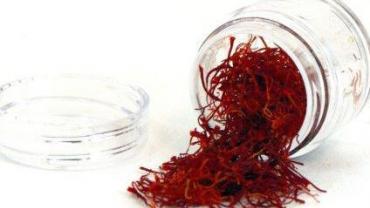
When you think about the most expensive exotic foods what comes to mind? White truffles for upwards of $6000/pound? Caviar for over $1500/pound? Kobe beef for $150/pound? Certainly there’s no shortage of gourmet delights to impress friends and please the palate—for a price. Each of these foods has a reason why it’s so prized be it the process required to grow or harvest it or the way the animals are raised and fed. When it comes to the specific category of seasonings there’s one spice that takes the financial cake: saffron. At anywhere from $500-$4500 per pound saffron is by far the most expensive spice in the world.
The reason it’s so pricey is because it comes from the stigmas of the crocus flower and each flower has just three stigmas—which are so delicate that they need to be harvested by hand—and it takes approximately 225000 stigmas to make one pound of saffron. Good thing it’s a strong flavor so a little goes a long way. Saffron is popular in the cuisine of the Middle East and North Africa but is especially famous for being the star of Spanish dishes such as the classic paella. When cooked saffron lends a warm yellow-orange color to food which is why it’s often used in rice and broths. Ground turmeric can be used as a substitute for a similar color and although the flavor isn’t exactly the same it’s similar enough to serve as a stand-in.
As holds true for many other herbs and spices—basil rosemary oregano ginger—the benefits of saffron go far beyond what it can do in the kitchen. Saffron might be a treat for the taste buds but what it can do for the mind may be even better. A solid body of research supports surprising but well-documented effects for saffron on depression anxiety and other mood disorders. This modern data lends scientific weight to the centuries-long use of saffron as an adaptogen in Ayurvedic and traditional Persian medicine.
Among adults with major depressive disorder supplementation with saffron has been shown to be as effective as commonly prescribed antidepressant medication without the unpleasant side-effects typical of these drugs. A double-blind randomized placebo-controlled trial (RCT) of adults who met the DSM-IV criteria for major depression showed that oral supplementation with saffron extract was more effective than placebo at improving scores on the commonly used Hamilton Rating Scale for Depression (HAM-D) with significant differences noted as early as two weeks after supplementation was initiated. In a double-blind randomized trial that compared the effects of saffron extract to the commonly prescribed selective serotonin reuptake inhibitor (SSRI) fluoxetine in adults with mild to moderate depression saffron extract demonstrated similar efficacy to fluoxetine in significantly improving HAM-D scores with fewer unpleasant side-effects. For patients who find that they do experience benefit from prescription SSRIs addition of a saffron supplement may help boost the efficacy of these agents. A double-blind RCT showed that compared to patients on an SSRI alone patients taking an SSRI plus a saffron supplement had greater improvements in mood anxiety depression and general health based on responses to multiple questionnaires. Aside from its serotonergic effects saffron’s mechanisms of action may be achieved via antioxidant anti-inflammatory and neuroprotective effects.
Among the undesirable side-effects of anti-depressant medication is interference with healthy sexual function. For men experiencing fluoxetine-related sexual dysfunction supplementation with saffron (15 mg B.I.D. for 4 weeks) resulted in significant improvement in erectile function compared to placebo although sexual desire and overall satisfaction did not differ between the groups. Saffron supplementation has demonstrated similar effects in women: among women with major depression who were taking fluoxetine and experienced subjective feelings of sexual dysfunction compared to placebo saffron supplementation (30 mg/d for 4 weeks) resulted in significantly greater improvements in Female Sexual Function Index arousal and lubrication but similar to the men no changes in desire or satisfaction. Saffron has long been considered an aphrodisiac and now there’s at least some data to substantiate that.
A relaxed candlelit meal at a cozy Spanish restaurant with good food and good wine might be a mood booster and aphrodisiac all by itself…or maybe it’s the saffron!